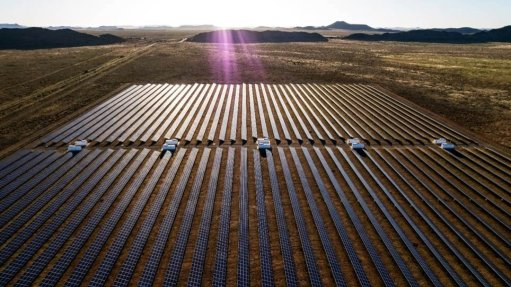Sustainable aviation fuels can be a potential green industry in South Africa
Sustainable aviation fuels (SAF) can contribute to a 65% reduction of emissions in the aviation industry by 2050, and South Africa has an excellent resource base to produce like-for-like replacements for fossil fuel-derived fuels that can be used with existing equipment and aeroplanes, says global conservation organisation World Wide Fund for Nature South Africa (WWF-SA) bioenergy analyst Farai Chireshe.
Unlike road transport, which can mitigate emissions through electrification, long-haul aviation is more difficult to decarbonise, which underpins demand for SAF.
"South Africa has or can produce various feedstocks that can be used to produce SAF without impacting on food security, has extensive experience in Fischer-Tropsch processes that present an opportunity to tap into existing expertise, and also needs to decarbonise its own aviation sector," he says.
The WWF-SA and its research partners Stellenbosch University, the Council for Scientific and Industrial Research and Imperial Logistics have assessed the potential for SAF production in South Africa by looking at seven potential feedstocks and technology combinations.
The study investigated the use of solaris seeds, which is a nicotine-free tobacco variant that had been successfully trialed in Limpopo; sugarcane; industrial waste gases; and invasive alien plants, also called lignocellulosic waste, among others, to produce SAF.
The study looked at two scenarios for SAF. The first is an energy self-sufficient scenario where the facilities produce sufficient energy to meet their processing demands, requiring hydrogen only to convert some feedstocks.
The second scenario looked at where renewable energy and green hydrogen are used in biorefineries to produce SAF.
Developing the SAF industry locally presents significant opportunities for export of SAF to markets with structural demand for aviation fuels, such as Europe and the US, he adds.
The study estimated that the industry could produce 3.2-billion litres a year of SAF, increasing to 4.5-billion litres if green hydrogen and renewable energy were also used, and South Africa's local demand for aviation fuels was 2.5-billion litres a year before Covid-19, says Chireshe.
The study performed centre of gravity analyses, including suitable potential production areas and transport distances, among others, to identify potential locations for SAF facilities.
"The north-eastern parts of the country have the most biomass in terms of invasive alien plants and are suitable for growing solaris. Some of the facilities can viably be located close to the Durban area and others will be close to the Natref refinery, in Mpumalanga.
"The majority of jobs in a biofuels industry will be in the north-eastern parts of the country, which also host most of the country's coal mining, and this presents a nice synergy and opportunity for a transition to SAF," he says.
Further, the WWF-SA study determined that South Africa would be able to produce SAF that is cost-competitive with prices at which SAF is currently sold; however, he notes that SAF remains three to four times more expensive than fossil fuel-derived jet fuels.
"There is a ready market for SAF and a structural shortage of SAF in the global market. If greater production is achieved, and large companies such as [energy and chemicals multinational] Sasol start producing SAF, the costs of locally produced SAF can come down. This is an opportunity we need to focus on as a country," says Chireshe.
Domestic SAF production can help South Africa to progress to a lower-carbon economy and can provide 90 000 direct jobs, including about 20 000 farm jobs, 7 500 trucking jobs and about 800 clerical and support jobs.
Further, there is about 200-million tons of dry invasive alien plant mass in South Africa and, although various programmes are aimed at combatting invasive alien plants, such as the Working for Water programme, most of the time the biomass is left in the field without any additional valorisation, he says.
"Producing SAF is an opportunity to derive economic value from this biomass. South Africa has a national challenge with invasive alien plants, and exploitable biomass was estimated through modelling of the presence of invasive alien plants on slopes up to 35° incline that will then be transported by trucks to intermediate facilities that produce feedstocks for final, centralised SAF production facilities," he says.
Article Enquiry
Email Article
Save Article
Feedback
To advertise email advertising@creamermedia.co.za or click here
Announcements
What's On
Subscribe to improve your user experience...
Option 1 (equivalent of R125 a month):
Receive a weekly copy of Creamer Media's Engineering News & Mining Weekly magazine
(print copy for those in South Africa and e-magazine for those outside of South Africa)
Receive daily email newsletters
Access to full search results
Access archive of magazine back copies
Access to Projects in Progress
Access to ONE Research Report of your choice in PDF format
Option 2 (equivalent of R375 a month):
All benefits from Option 1
PLUS
Access to Creamer Media's Research Channel Africa for ALL Research Reports, in PDF format, on various industrial and mining sectors
including Electricity; Water; Energy Transition; Hydrogen; Roads, Rail and Ports; Coal; Gold; Platinum; Battery Metals; etc.
Already a subscriber?
Forgotten your password?
Receive weekly copy of Creamer Media's Engineering News & Mining Weekly magazine (print copy for those in South Africa and e-magazine for those outside of South Africa)
➕
Recieve daily email newsletters
➕
Access to full search results
➕
Access archive of magazine back copies
➕
Access to Projects in Progress
➕
Access to ONE Research Report of your choice in PDF format
RESEARCH CHANNEL AFRICA
R4500 (equivalent of R375 a month)
SUBSCRIBEAll benefits from Option 1
➕
Access to Creamer Media's Research Channel Africa for ALL Research Reports on various industrial and mining sectors, in PDF format, including on:
Electricity
➕
Water
➕
Energy Transition
➕
Hydrogen
➕
Roads, Rail and Ports
➕
Coal
➕
Gold
➕
Platinum
➕
Battery Metals
➕
etc.
Receive all benefits from Option 1 or Option 2 delivered to numerous people at your company
➕
Multiple User names and Passwords for simultaneous log-ins
➕
Intranet integration access to all in your organisation


















